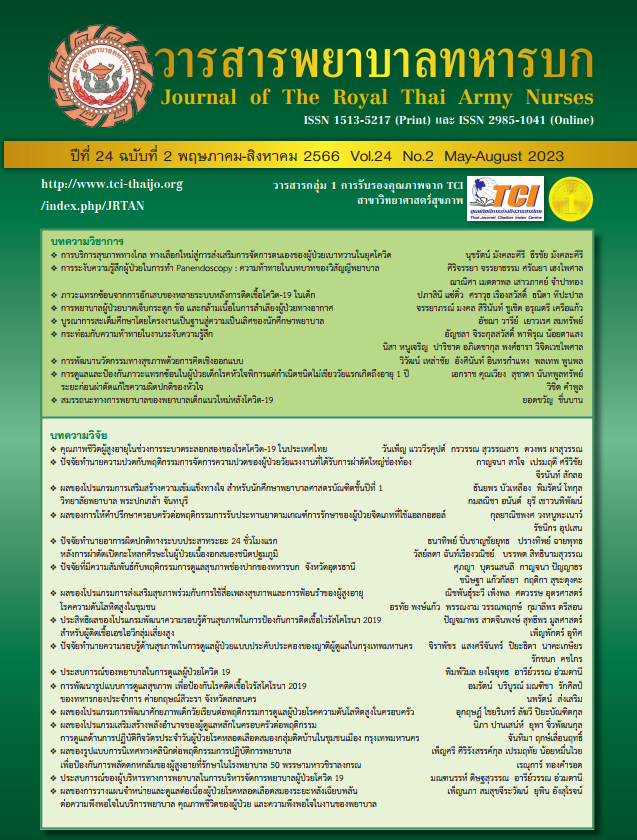Effects of Discharge Planning and Continuing Care of Post-acute Stroke Patients on Nursing Service Satisfaction, Patients’ Quality of Life, and Nurses’ Job Satisfaction
Keywords:
discharge planning, continuing care, stroke patients, satisfaction, quality of lifeAbstract
The purposes of this experimental research was to study effects of discharge planning and continuing care of post - acute stroke patients on nursing service satisfaction, patients’ quality of life, and nurses’ job satisfaction. The total of 30 subjects were purposively assigned to either the experimental group or the control group, 15 in each group. The study 2 groups posttest design. The other group of subjects consisted of 9 nurses assigned to rehabilitation wards. The study was a one-group pretest posttest design. The research instruments included the discharge planning and continuing care, program discharge planning and continuing care, summary of discharge planning and continuing care, and Nursing Service Satisfaction Questionnaire and Patients’ Quality of Life Questionnaire and Nurses’ Job Satisfaction Questionnaire. All research instruments were tested for content validity by a panel of five experts. The nursing service satisfaction questionnaire, patients’ quality of life questionnaire and nurses’ job satisfaction questionnaire had Cronbach’s alpha coefficient of 0.98, 0.94 and 0.95, respectively. All data were analyzed by means, standard deviations, and nonparametric tests
Major results of the study were as followed: Nursing service satisfaction of the patients who received the discharge planning and continuing care nursing were significantly higher than that of the post-acute stroke patients who received routine nursing care, Quality of life among patients who received the discharge planning and continuing care were significantly higher than that of the post-acute stroke patients who received routine nursing care, and Job satisfaction of nurses that after provided of the post-acute stroke patients and continuing care were significantly higher than before that of the post-acute stroke patients, at the .05 level. The results of this study: The discharge planning and continuing care should be implemented on an ongoing basis for better patient outcomes. And improve the quality of nursing care.
Downloads
References
Orathai Khiaocharoen, Supasit Pannarunothai, Wachara Riewpaiboon, Chairoj Zungsontiporn. Rehabilitation Service Development for Sub-acute and Non-acute Patients under Universal Coverage Scheme in Thailand. Journal of Health Science. 2015:493-509. (in Thai)
Ministry of Public Health (Service Plan). Guideline for Intermediate Care (Service Plan). Samut Sakhon: Born to be Publishing co.ltd.; 2019. (in Thai)
Clarke DJ. The role of multidisciplinary team care in stroke rehabilitation. Progress in Neurology and Psychiatry. 2013;17(4):5-8.
Faria AdCA, Martins MMFPdS, Schoeller SD, Matos LOd. Care path of person with stroke: From onset to rehabilitation. Revista Brasileira De Enfermagem. 2017;70:495-503.
The Healthcare Accreditation Institute (Public Organization). Hospital and Healthcare Standards. Nonthaburi: D-One Book Company Limited; 2018. (in Thai)
Aphiradi Papol, Chanida Rumkhaun, Vijitra Pinnoi. A Study of Fall Risk in Stroke Patients after Hospital Discharge. Journal of The Royal Thai Army Nurses. 2017;18:194-201. (in Thai)
Lamaiporn Lohityothin & Ratchanok Choopichai. The development of rehabilitation nursing service system for stroke patients in Sirindhorn National Medical Rehabilitation Center. Journal of Nursing Division. 2013;3:9-21. (in Thai)
Nursing Division, Ministry of Public Health. Guidelines for collecting indicators for improving the quality of nursing service 2019. Nonthaburi: Publishing of Suetawan Co. Ltd.; 2019. (in Thai)
Chick, N., and Meleis, A. I. Transitions: A nursing concern. 1986; 237-57.
Wanpen Phichitpornchai & Usavadee Asdornwised. Discharge planning, Concepts and Aplied (Revised edition). Bangkok: Faculty of Nursing Mahidol University; 2004. (in Thai)
Elliott, S. & Reimer, C. Postdischarge telephone follow-up program for breastfeeding preterm infants discharged from a special care nursery. Neonatal network: 17(6). 41-5
Pramote Wongsawat. Experimental Research Design: Application for Research to Improve Health Behaviors. Bangkok: CDMK printing; 2018. (in Thai)
Wong FKY, Yeung SM. Effects of a 4-week transitional care programme for discharged stroke survivors in Hong Kong: A randomized controlled trial. Health & Social Care in The Community. 2015;23(6):619-31.
Ladawan Ritklar. Results of discharge planning by using D-METHOD on re-admission and satisfaction in patients with coronary artery disease. Thammasat University Hospital Journal Online. 2018;3(3):19-27. (in Thai)
Jarupak Sukhumanpitak, Walaiporn Nantsupawat, Promjit Hornboonherm. Development of a Care Model for Male Stroke Patients in Secondary Hospital Using A Participatory Action Research. Journal of Nursing and Health Care. 2013;30(1):32-8. (in Thai)
Auayporn Chongsa, Siriporn Srisun.Omicce Model Phaholpolpayuhaseana Hospital Care Management Model for Ischemic Stroke Patients to Enhance Activity of Daily Living:OMICCE Model. Region 4-5 Medical Journal. 2020;39(3):454-71. (in Thai)
Chamaiporn Buapin, Pornchai Julamad, Niyom Pisitpipattana. Effects of a Clinical Nursing Practice Guideline for Discharge Planning on the Quality of Life of Elderly Stroke Survivors. The Southern College Network Journal of Nursing and Public Health. 2018; 6: 51-62. (in Thai)
Lee, K. B., Lim, S. H., Kim, K. J., Kim, Y. R., Chang, W. N., Yeom, J. W., Kim, Y. D., & Hwang, B.Y. Six-month functional recovery of stroke patients: A multi-time-point study. International Journal of Rehabilitation Research. 2015; 38(2): 173-80.
Tassanee Jintaganon. Health Related Quality of Life in Stroke Survivors. Region 4-5 Medical Journal. 2019;38(2):114-24. (in Thai)
Downloads
Published
How to Cite
Issue
Section
License
Copyright (c) 2023 Journal of The Royal Thai Army Nurses

This work is licensed under a Creative Commons Attribution-NonCommercial-NoDerivatives 4.0 International License.
บทความหรือข้อคิดเห็นใดใดที่ปรากฏในวารสารพยาบาลทหารบกเป็นวรรณกรรมของผู้เขียน ซึ่งบรรณาธิการหรือสมาคมพยาบาลทหารบก ไม่จำเป็นต้องเห็นด้วย
บทความที่ได้รับการตีพิมพ์เป็นลิขสิทธิ์ของวารสารพยาบาลทหารบก
The ideas and opinions expressed in the Journal of The Royal Thai Army Nurses are those of the authors and not necessarily those
of the editor or Royal Thai Army Nurses Association.






